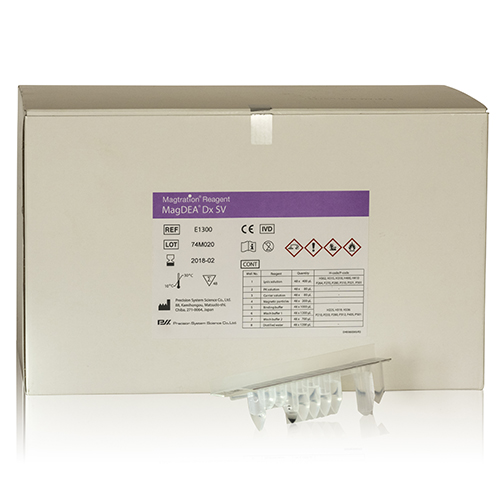Prefilled Reagent Cartridge for Magnetic Bead Based Nucleic Acid Extractions
Product Description
Part Number: E1300
The MagDEA Dx SV is a magnetic bead-based chemistry for extracting total nucleic acids from a wide variety of biological samples. The SV kit is suitable for extraction starting volumes of 200 or 400 µl and elutes in either 50, 100, 200 µl volumes. The extraction process includes sample lysis, proteinase K digestion, magnetic bead adsorption, washing and elution for high-yield and high-purity DNA/RNA recovery with extremely low guanidinium salt carry over. The reagent cartridge is self-contained providing all necessary chemistry and waste collection.
Features | |
|---|---|
Sample Types | Magnetic bead chemistry and protocols optimized for many sample types |
Reagents | Individually sealed and ready to use reagents cartridges, reagents suitable for many sample types |
Tracking | Barcoded for manufacturing and QC tracking |
Storage | Stable at room temperature storage and shipping temperatures |
Instruments | Optimized for use with magLEAD and geneLEAD instruments |
Required Consumable | magLEAD® Consumable Kit |
Specification | |
|---|---|
Test Capacity | 48 individual sealed reagent cartridges |
Principle | BOOM method of solid phase extraction
|
Samples | Whole Blood, Plasma, Serum, Swabs, CSF, Sputum, Stool, Urine, Tissue |
Targets | Total nucleic acid (virus DNA/RNA, genomic DNA) |
Sample volume | 200, 400 µL |
Elution volume | 50, 100, 200 µL |
Extraction time | 200 µL: 27 min 400 µL: 40 min |
Manufacture | PSS. All components manufactured under ISO 13485:2016 accreditation in a Class 100,000 clean room. |
Extraction Kits & Consumables | |
|---|---|
magLEAD® Consumable Kit |
50 test unit, consumables for magLEAD® 6gC and magLEAD® 12gC |
magDEA Dx Protocol Cards | Volume Specific and Instrument Specific Extraction Protocols |
Meeting the Changing Demands of Specialized Fields
Simplifying the Science of Discovery
PSS is committed to the rapid development of products in various fields such as infectious disease, oncology, genetics, human identification, animals, and plants in order to contribute to the world’s ongoing health needs.
